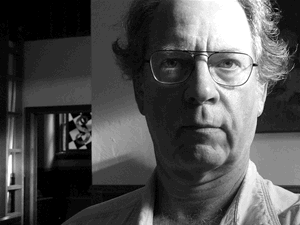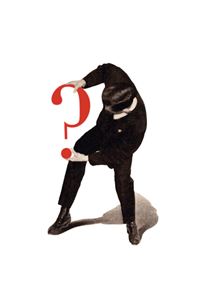Inquisitive
Padgett Powell returns with a novel written entirely in questions
Padgett Powell is a genius of American letters, a brilliant but eccentric writer who looms on the margins of the mainstream. After his first novel, Edisto (1984), won critical praise and an enthusiastic readership, his writing drifted into “surreal lines,” as he describes it. His four novels and two story collections since Edisto have eschewed conventional plot and sympathetic characters for experiments in voice and form.
In a 2006 interview with The Believer, Powell admitted that he “naturally got tired … of the purely realistic utterance” and that now he has “swung so far” away from traditional narrative that “I’m virtually unpublishable.” Fortunately, his newest work of fiction (after nine years of silence), The Interrogative Mood, has found a publisher, so readers may once again enjoy Powell’s trippy world play and skewed world view.
The entire text of The Interrogative Mood consists of questions posed by an unnamed narrator to “you,” the reader. It feels at times like an abstract exploration into the value of life and how to construct meaning out of one’s existence; at other times the questions seem to emanate from a particular source: an aging American confronting the vagaries of middle age and looking back on a life slipping away by imperceptible degrees.
 The questions that Powell asks in his ventriloquist’s voice fall into some recognizable categories. Many are intended to define personality types: “Do you regard living with routines as liberating or shackling?” and “If you could have feathers instead of hair, would you?” The questions follow no logical order—“What is the ideal percentage of cocoa in chocolate for you? Would you like to have been at the Alamo? Pearl Harbor?”—but together they help “you” assemble an enlightening personal profile.
The questions that Powell asks in his ventriloquist’s voice fall into some recognizable categories. Many are intended to define personality types: “Do you regard living with routines as liberating or shackling?” and “If you could have feathers instead of hair, would you?” The questions follow no logical order—“What is the ideal percentage of cocoa in chocolate for you? Would you like to have been at the Alamo? Pearl Harbor?”—but together they help “you” assemble an enlightening personal profile.
Powell’s interrogator appears particularly interested in questions of honor and bravery. “Are you a physical coward? Are you bothered by your cowardice?” The narrator never reveals why these questions are haunting, allowing readers to insert their own experiences to the open-ended examination of conscience: “Is feeling bad about something all one’s life anything to particularly feel bad about? Are we redeemed by regret?”
The gravity of those questions is leavened by the more frequent appearance of wry observation and perverse humor. Readers will find themselves laughing more often than brooding. “Doesn’t it seem as if the heyday of hemorrhoid-cream advertising is over?” Powell asks, apropos of nothing in the known universe. “Would you say that you are pro peanut brittle, anti peanut brittle, or would you say ‘I do not have a dog in the peanut-brittle fight’?” In a similar vein Powell asks, “Are you attracted to sausage (and to the idea of sausage), or are you repulsed by it, or are you sausage neutral?”
 With the screwball comedy, Powell mixes in oblique ruminations on the issue of aging. The questions address physical depredations (“At what point in human life would you say the nostril transforms from a cute thing to a not cute thing?”) as well as the more subtle, cultural signs of getting older (“At what age do you find pothead jazz enthusiasts tiresome or embarrassing?”). The narrator is familiar with mental slippage (“How often do you ask yourself, ‘What am I forgetting?’”) and exploratory surgery (“Have you had any medical procedures that involve the insertion of fiber-optical or other tubing in you that allows inspection of your innards?”). Just once Powell ponders at what point should debilitation justify suicide, but largely he leaves the reader to draw private conclusions.
With the screwball comedy, Powell mixes in oblique ruminations on the issue of aging. The questions address physical depredations (“At what point in human life would you say the nostril transforms from a cute thing to a not cute thing?”) as well as the more subtle, cultural signs of getting older (“At what age do you find pothead jazz enthusiasts tiresome or embarrassing?”). The narrator is familiar with mental slippage (“How often do you ask yourself, ‘What am I forgetting?’”) and exploratory surgery (“Have you had any medical procedures that involve the insertion of fiber-optical or other tubing in you that allows inspection of your innards?”). Just once Powell ponders at what point should debilitation justify suicide, but largely he leaves the reader to draw private conclusions.
Other questions probe whether the reader is as old as the narrator and, if so, ask if the reader too feels the past drifting away: “Do you remember the custom automotive gas pedal that resembled a large bare chrome human foot?” and “Do you recall, and did you ever try to use, all-metal roller skates that strapped over your shoes?” But to remember, in Powell’s rendering, is not the same as romanticizing; those same “old metal roller skates,” the narrator reminds us, “had no flexibility or suspension and the wheels gained no traction whatsoever … so that the net effect of skating on those things was akin to ice skating on concrete.”
What makes this book, in many ways sui generis, an identifiable relative to Powell’s earlier work is its fascination with the sound of language. The narrator rolls words on his tongue and takes pleasure in their texture. “Isn’t ‘in tattered array’ lovely?” he muses. “Is there a connection between beholdenbehemoth?” This book makes us aware that the words we use determine who we are: “Do you use terms like ‘triangulation’ and ‘extrapolation’ when not speaking mathematically?” Even when the narrator lets you form your own opinions (“What do you make of the word tinkle?”), you are still being led into his world of verbal meditation.
This novel reads quickly but accrues its effect slowly. Like David Markson’s pseudo-novels made up of literary and artistic trivia (Reader’s Block and This Is Not a Novel), Powell’s book mesmerizes with wave after wave of thought, its cumulative effect not reducible to thesis statements or philosophical messages. Rather, The Interrogative Mood inclines the reader toward a speculative state of mind in which the world seems endlessly intriguing and manifestly worthwhile.
The Interrogative Mood asks readers to reckon their own lives: what have you accomplished, in big arenas (love, career, family) and small (kites, pets), and what is left for you to do? Have you spent enough time enjoying life’s little pleasures? (“Has it been a while since you cracked a can of ready-made biscuits over the counter and felt that gratifying modest explosion of clammy dough in your hand?”) This novel demystifies personality (we are all collections of predilections and peeves) but marvels at existence, its specificity and expanse. There is always more to know, Powell demonstrates, as long we adopt an inquisitive frame of mind.
Padgett Powell will give a free public reading at the Sewanee Writers’ Conference on July 18 at 8:15 p.m.



